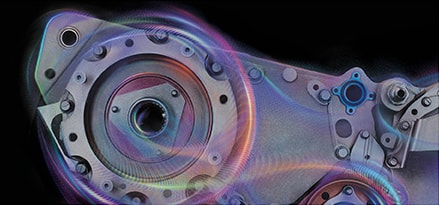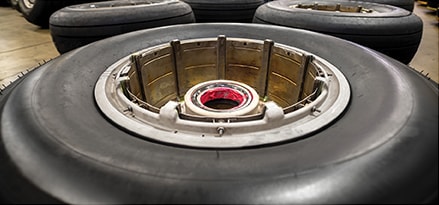Mobil Jet™ Oil 387

ExxonMobil and Japan Airlines: A legacy of passion and partnership
Reasons to trust Mobil Jet Oil 387
- Designed to deliver optimal engine performance and help operators avoid unscheduled/premature engine maintenance
- Offers exceptional elastomer compatibility, helping minimize oil leaks that can cause delays, cancellations and costly repairs
- Provides optimal wear protection, oxidative and thermal stability, and excellent deposit control, helping operators reduce unscheduled maintenance and maximize revenue-generating hours
- Offers excellent low-temperature fluidity in extreme temperatures as low as -40 degrees Fahrenheit
Mobil Jet™ Oil 387 underwent 10+ years of extensive research and development and is one of the most tested oils on the market. It was subjected to rigorous testing on the ground and in flight, and was designed with custom-made molecules to deliver outstanding performance in HTS/HPC oils.
Proactively developed to respond to the evolving needs of our customers and the industry, Mobil Jet Oil 387 is our most advanced turbine oil ever developed. Specifically formulated to deliver unsurpassed engine performance, it strikes the perfect balance, providing optimal engine performance and advanced protection for engines and components. Featuring exceptional elastomer compatibility, excellent thermal and oxidative stability and advanced deposit control, Mobil Jet Oil 387 delivers a balance that has never before been achieved with a turbine oil, raising the bar in jet engine lubrication.
Mobil Jet Oil 387 is approved for use in an array of engine models and components.
Product information
Data sheets
Features and Benefits
Mobil Jet Oil 387 shows excellent performance controlling deposits typically experienced in both the liquid and vapor phases in bearing compartments, oil supply lines, and breather/scavenger lines. These properties have been confirmed in various laboratory tests, including the Corrosion-Oxidation Stability Test, Alcor Deposition Test, Vapor Phase Coker, Erdco High-Temperature Bearing Test, Ryder Gear, and the Mobil Thin Film Oxidation Test.
The closely controlled viscosity of Mobil Jet Oil 387 at -40°C (-40°F), and a pour point below -54°C (-65°F), ensure the good low-temperature fluidity which permits starting and lubrication at temperatures as low as -40°C. In extensive laboratory testing, Mobil Jet Oil 387 exhibits excellent bulk oil stability at temperatures greater than 225°C (437°F).
|
Features |
Advantages and Potential Benefits |
|
Long-duration fluorocarbon compatibility |
Helps avoid premature or unscheduled engine repairs. Helps prevent leaks that can lead to air craft delays and cancellations. |
|
Outstanding oil life characteristics, such as bulk oil stability, viscosity and TAN control |
Helps minimize formation of sludge and carbon deposits which allows better engine efficiency and reduced engine repair costs as well potentially achieving longer oil drain intervals (in certain applications such as marine and land based turbines), effective lubrication at high operating temperatures |
|
Very low vapor/mist and thin film deposition resistance |
Helps control deposits in air vent tubes, bearingcompartments, and scavenge oil lines which will all result in reduced engine maintenance costs |
|
Good low temperature fluidity |
Permits start-up and ensures effective lubrication of critical components (such as APUs in ETOPS applications) at temperatures as low as -40 °F |
Applications
Mobil Jet Oil 387 is approved against the new SAE AS5780 High Performance Capability (HPC) standard. This civil specification was developed to meet the growing performance and quality needs that commercial airlines seek, especially with the entrance of new, higher-output and lower consumption engines.
OEM in-house evaluation/approval programs are also underway. Once complete, Mobil Jet Oil 387 will be commercialized for use in aircraft gas turbine engines, including turbo-jet, turbo-fan, turbo-prop, and turbo-shaft (helicopter), in commercial and military service. In addition, it will be suitable for aircraft-type gas turbine engines in industrial and marine applications.
Mobil Jet Oil 387 is compatible with other synthetic gas turbine lubricants meeting U.S. Military Specification MIL-PRF-23699. Mixing with other products, however, could result in some loss of its superior performance features. The lubricant is completely compatible with all metals used in gas turbine construction, as well as with F Rubber (Viton A), H Rubber (Buna N), and other commonly used seal materials. Engine/OEM Evaluations
Mobil Jet Oil 387 has the following builder approvals: *
• General Electric Aviation
• Rolls Royce
• Pratt & Whitney
• Honeywell APUs
• UTC Aerospace Systems APUs, Generators and Starters
Mobil Jet Oil 387 has the following builder approvals in progress : *
• CFM International
• Engine Alliance
• International Aero Engines
• Honeywell turbine engines
* Specific engine or equipment approval must be verified with the builder
Specifications and Approvals
|
|
|
SAE AS 5780 HPC |
|
MIL (US) MIL-PRF-23699 HTS |
Properties and Specifications
|
Property |
|
|
Autogenous-ignition temperature test, deg.C, 30 CFR 35.20 |
405 |
|
Change in Kinematic Viscosity, 72 h @ -40 C, %, ASTM D2532 |
0.1 |
|
Elastomer Compatibility, AMS-3217/4 (72hrs @204C), % swell, FTMS 791-3604 |
15 |
|
Elastomer Compatibility,AMS-3217/1(72hr @70C), % swell, FTMS 791-3604 |
15 |
|
Evaporation Loss, 6.5 h, 204 C, mass%, ASTM D972(mod) |
4 |
|
Fire Point, °C, ASTM D92 |
292 |
|
Flash Point, Cleveland Open Cup, °C, ASTM D92 |
278 |
|
Foam, Sequence I, Tendency, ml, ASTM D892 |
10 |
|
Foam, Sequence II, Tendency, ml, ASTM D892 |
10 |
|
Foam, Sequence III, Tendency, ml, ASTM D892 |
10 |
|
Kinematic Viscosity @ 100 C, mm2/s, ASTM D445 |
5.2 |
|
Kinematic Viscosity @ 40 C, mm2/s, ASTM D445 |
25.9 |
|
Kinematic Viscosity @ -40 C, mm2/s, ASTM D445 |
10140 |
|
Pour Point, °C, ASTM D5950 |
-57 |
|
Ryder Gear Load Carrying, % vs ref., FTMS 791-6508 |
2806 |
|
Specific Gravity, 15 C/15 C, ASTM D4052 |
0.999 |
|
Total Acid Number, mgKOH/g, ARP 5088 |
0.03 |
Health and safety
Health and Safety recommendations for this product can be found on the Material Safety Data Sheet (MSDS) @ http://www.msds.exxonmobil.com/psims/psims.aspx
Engine Alliance (EA) GP7200
GE Aviation 9X
GE Aviation CF34-10
GE Aviation CF34-10E
GE Aviation CF6-6
GE Aviation CF6-50
GE Aviation CF6-80
GE Aviation CF6-80C2
GE Aviation CF6-80E
GE Aviation GE90
GE Aviation GEnX-1B
GE Aviation GEnX-2B
Hamilton Sundstrand/UTAS APS 1000
Hamilton Sundstrand/UTAS APS 2000
Hamilton Sundstrand/UTAS APS 2100
Hamilton Sundstrand/UTAS APS 2300
Hamilton Sundstrand/UTAS APS 2600
Hamilton Sundstrand/UTAS APS 3200
Hamilton Sundstrand/UTAS APS 500
Hamilton Sundstrand/UTAS IDG
Hamilton Sundstrand/UTAS VFSG
Honeywell 131-9
Honeywell 131-9B
Honeywell 131-9C
Honeywell 331-500
Honeywell 331-600
Honeywell 331-200
Honeywell 331-350
Honeywell GTCP 36-300
Honeywell GTCP 660
Honeywell GTCP-85
Honeywell HGT-1700
Honeywell HGT-750
Honeywell RE220
Pratt & Whitney PW1100G-JM
Pratt & Whitney PW1400G-JM
Pratt & Whitney PW1500G
Pratt & Whitney PW1700G
Pratt & Whitney PW1900G
Pratt & Whitney PW1900G-JM
Pratt & Whitney PW4000
Rolls Royce BR715
Rolls Royce M250
Rolls Royce - RB211-500
Rolls Royce RR300
Rolls Royce Trent 700
Rolls Royce Trent 7000
Rolls Royce Trent 800
Rolls Royce Trent 900
Rolls Royce Trent XWB
Safran VFG
- Military use
- Elastomer compatibility
- Severe operating conditions
- Deposit control
- Extended temperature range
- Wear protection
- Maximize component life
- Balanced formulation
- High performance
- SAE AS5780 HPC
- MIL-PRF-23699-HTS
- PRI-QPL-AS5780/HPC
-

Mobil™ Aviation Grease SHC™ 100
Mobil Aviation Grease SHC 100 is a supreme performance synthetic grease which combines the unique features of a polyalphaolefin (PAO) synthetic base fluid with those of a high quality lithium complex soap thickener. The thickener system provides a high dropping point, excellent resistance to water wash, and a tenacious structural stability.
-

Mobil™ HyJet™ V
Mobil HyJet V is a Type V fire-resistant phosphate ester hydraulic fluid, which is superior in thermal and hydrolytic stability to commercially available Type IV hydraulic fluids. Better stability means the extent of fluid degradation in aircraft systems will be less than Type IV fluids, in-service fluid life will be longer, and consequently aircraft operator maintenance costs may be lower.







